This post includes spoilers for "Butter on the Latch." This is meant to be more of an in-depth analysis of the film's exploration of sexual trauma (as opposed to a review), so it's probably going to be useless/boring if you haven't actually seen the film. Don't say I didn't warn you.
After watching Josephine Decker's first feature, "Butter on the Latch" (2013), I found myself obsessing over the film's portrayal of sexual trauma. More often than not, I feel dissatisfied (or downright angry) by the way this issue is depicted on screen. I hated "Promising Young Woman" (Fennell, 2020), "Elle" (Verhoeven, 2016), and even had issues with "The Nightingale" (Kent, 2018), which many of my friends enjoyed. There have certainly been some recent successful explorations, like Michaela Coel's "I May Destroy You," but an overwhelming majority lack nuance, especially when considering the lingering effects on female sexuality. In real life, sexual trauma is often difficult to rationalize internally and externally, especially when the root cause is not easily understood.
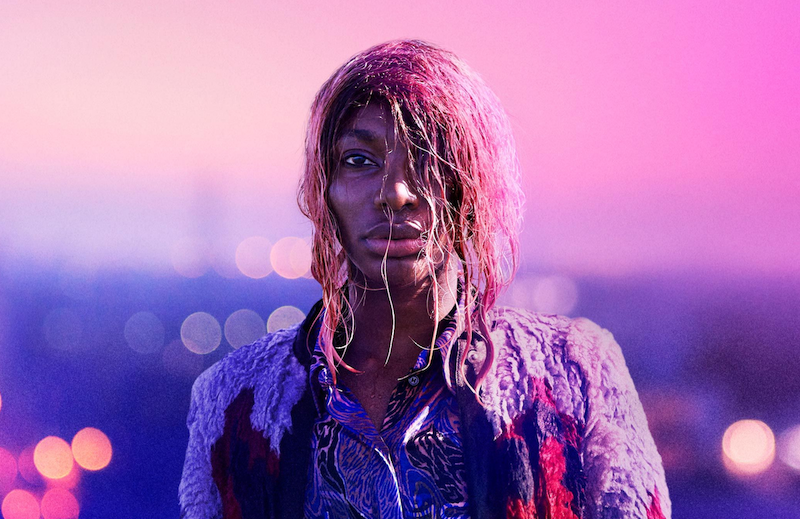
Until I saw "Butter on the Latch," I hadn't considered how perfect the experimental film genre could be for depicting the psychological mindfuck of sexual assault, especially when it happens under the influence of alcohol and/or drugs. Instead of trying to create a cohesive narrative or explain every event, Decker gives the viewer space to observe and draw conclusions without coercion. With sensitive topics, there is often a desire to overexplain in an attempt to avoid misunderstanding. Decker doesn't give in to that impulse, which makes her film hit harder because it leaves room for personal interpretation. By using a female friendship to demonstrate the damaging repercussions of unaddressed trauma, this film helped me view some of my own experiences with new eyes.
"Butter on the Latch" is not a plot-heavy film, but the general outline is that two friends, Sarah (Sarah Small) and Isolde (Isolde Chae-Lawrence), unexpectedly reunite at a Balkan folk song and dance camp in the woods of Mendocino, California. Their relationship feels intimate until a banjo-playing man named Steph (Charlie Hewson) drives a wedge between them. This short description makes the film sound like a straightforward tale of female jealousy, but deeper motivations influence the dynamic between the women. They are tied together by indistinguishable, upsetting sexual experiences that aren't clearly labeled as assault but certainly look that way to me.
The film starts with a snippet from a live performance art piece in which two seated men in white dresses and veils work themselves up into a physical frenzy that culminates in them shouting "one" in unison. With arms linked, they fall back together and expose their bloomer-clad asses to uproarious laughter from the audience. When I initially saw the film, I knew that this opening scene must be significant but had no idea how to interpret it. In retrospect, I can see that it links Sarah and Isolde together — not through ritualistic matrimony, but complete chaos. It might not make sense in the moment, but it primes the viewer for what is soon to come.
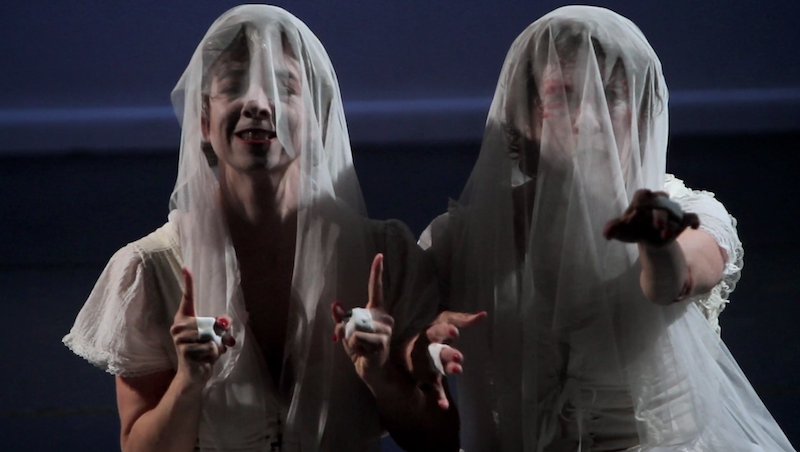
After the show ends, Sarah and an unnamed female companion walk out of the theater onto the sun-dappled streets of New York City and part ways. It all feels relatively normal, but the tight handheld camera adds a layer of claustrophobic anxiety to the environment. As Sarah receives a call on her cell phone, the intensity increases. Her speech becomes frantic as the camera moves to close-up in profile, occasionally swiveling around the street with different objects coming in and out of focus. The performance is all but forgotten as the intensity ratchets up and the viewer is plunged into another fragmented reality.
From snippets of a one-sided conversation, we gather that the person on the other end of the line, someone Sarah refers to as "Pony," has woken up after a night out in an unfamiliar place with strange men and no memories of how they got there. Sarah is visibly distraught by this information, screaming "Get out, get out right now!" and teetering on the edge of tears. As the primarily out-of-focus camera spins around the sidewalk, we hear Sarah say, "I'm coming to get you out of that house. Who the fuck were those people?" After a brief cut, Sarah is visible again, this time on a darkened sidewalk, screaming "NO!" and kicking a building's front gate. I assume that she went to find Pony but was unsuccessful in her search; however, the film doesn't provide any clarity.
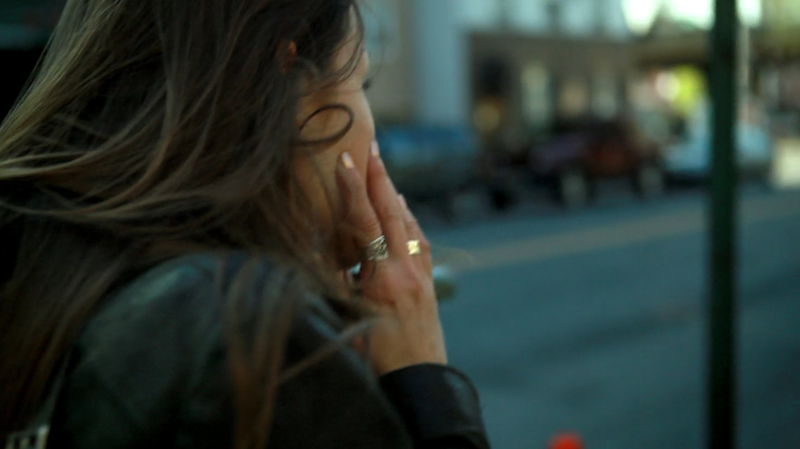
From there, the "plot" only grows stranger. Post-scream, Sarah walks away in blithe spirits. She lets her hand graze the metal as she passes by a fence, making a pleasant "clink" as her rings achieve contact. In the next scene, she's bathed in blue and pink club lights, dancing with a man who is engulfed in shadow. When Sarah wakes up the next morning, she's in bed with a different man. The handheld camera, frame composition, and sound all hint at sexual assault. Snores are audible in the background as the man jerks his arm toward his crotch, triggering a sound that I immediately assumed was a condom being removed. Luckily, it was only a piece of tape stuck to the edge of the bed. As the camera comes into focus, a harmonica, not a penis, is visible in the man's hand.
The sound and shot composition prepare the viewer for something more graphic, so it's a relief when expectations are diverted; however, this feeling is short-lived. As Sarah wakes up in her underwear next to this silent stranger, it becomes worse to not know exactly what happened. Decker spares the viewer from watching a sexual assault, but this doesn't mean that it didn't occur. Sarah and the viewer are both in a position where they must choose what story to believe. While all signs point to an obvious conclusion, there is enough ambiguity for an alternate narrative to take hold.
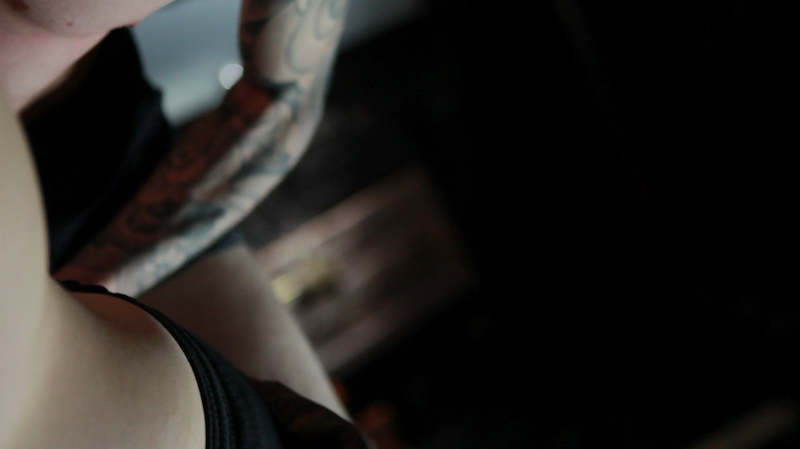
It's as if Sarah has somehow slipped into the experience described by Pony over the phone. As she walks around the room to gather her personal belongings, men who have been lurking in the shadows come into focus. They watch with cold detachment as Sarah races toward the exit. No one tries to stop or question her, but the inherent danger of the situation never dissipates. Many women — myself included — have woken up in similar states of addled disarray. It is deeply shameful and difficult to acknowledge, even while it's still technically happening. We don't know if Sarah was drugged or had too much to drink; those details are irrelevant. The terror she feels upon waking is all that matters.
In the next scene, Decker transports the viewer to the West Coast without preamble. Mountains roll by from outside a car window and blue skies peek through layers of fog. Brooklyn is now far away, but what happened there hangs on the periphery. As I watched, I kept waiting for the film to return to these earlier moments. Framing a story in this brutal, disorienting fashion is no accident. As the film progresses, the viewer starts to wonder if the opening events even happened. Maybe they were some kind of strange fever dream or an elaborate performance art piece à la the men in white gowns. The trauma of the first six minutes hangs over the rest of the film, begging for Sarah to acknowledge it. The viewer can't make sense of it without her input.
When Sarah runs into Isolde at the Balkan camp, they immediately greet each other like old friends. As the out-of-focus camera jostles around at a distance, they run toward each other and embrace. Sarah tells Isolde, "You look so much happier," but neither woman dwells on this observation. There is no explanation of how they know each other or when they last spent time together.
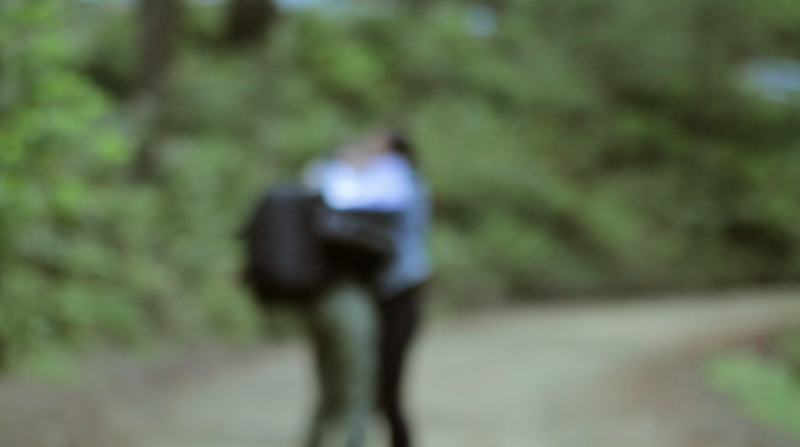
The first substantial exchange between them comes later that night, as they brush their teeth in the bathroom together while talking about sex. Sarah tells Isolde about getting fucked in the ass by a guy named Simon in a way that quickly becomes disturbing despite the amount of laughter from both women. While she describes the sex as "awesome," the following details don't support that claim.
Sarah: He's always so surprising, like it was... I don't know how he pulled that off, it was as if we were, like, falling asleep and then all of a sudden...
Isolde: He just pulled a fast one on you? That's usually how it starts, you know? Gain your trust and then...
Unless Simon lubed up his dick beforehand, the sex was probably uncomfortable at best, unbearably painful at worst. The first time I had anal sex, it happened exactly like this. Immediately after, I was like eh, whatever, but rage emerged as time passed. It's easy to turn uncomfortable sexual experiences into amusing anecdotes. I remember recounting my own in a way that made them sound enjoyable (they weren't) and gave me more power than I actually had. I reclaimed the narrative but in so doing, minimized my own emotions. It took me a few watches to see this scene for what it is: yet another example of sexual assault. Simon's actions — engaging in anal sex before first obtaining clear consent — exist on a spectrum with the disconcerting event at the beginning of the film.
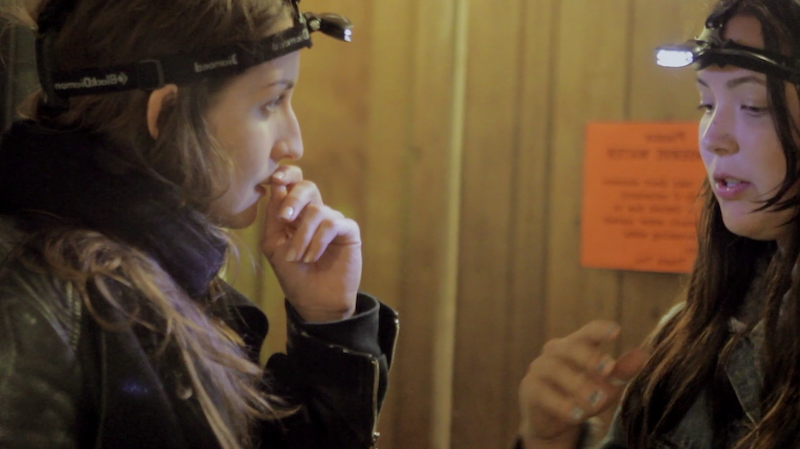
Isolde's story, about getting a salt scrub that quickly turns into unsolicited oral sex, is also sneakily alarming. From the jump, she expresses discomfort over not knowing what to expect from the service. The masseuse doesn't give her clear instructions, so she isn't sure what level of undress is appropriate. She recounts her internal thought process to Sarah: "I was like, 'Okay, this is all right, I understand, this is professional, so just go topless,' you know?" Isolde is going into this experience with the belief that there is nothing sexual about it. Her nudity is professional, not invitational, but the masseuse very quickly takes the service in an unexpected direction. As Isolde describes it, he "was really paying attention to, like, areas," along with stretching her out and massaging her ass. In other words, the masseuse started immediately pushing boundaries to see how she would respond. He was in a position of power, of guiding the experience for someone who didn't know what to expect, and he immediately abused it.
While Isolde describes the masseuse's actions as "totally hot" in retrospect, I wonder how she felt in the moment. Even if she did feel turned on when this horned-up massage was taking place, how must it feel to look back and realize that she was manipulated? When she recounts the masseuse's actions to Sarah, she uses the word "professional" multiple times.
Isolde: And then like, you know, he's soaping up your body and then he comes back in, you know, professionally wiping the salt off of your tits, like this, and then professionally, under the context of that this is, like, a professional massage.
Sarah: That's not professional.
Isolde: And I was like, I don't think I can fucking handle this anymore. Like, I can't hold it together, this is way too steamy. This guy is a babe, he's rubbing my tits, he's all over me.
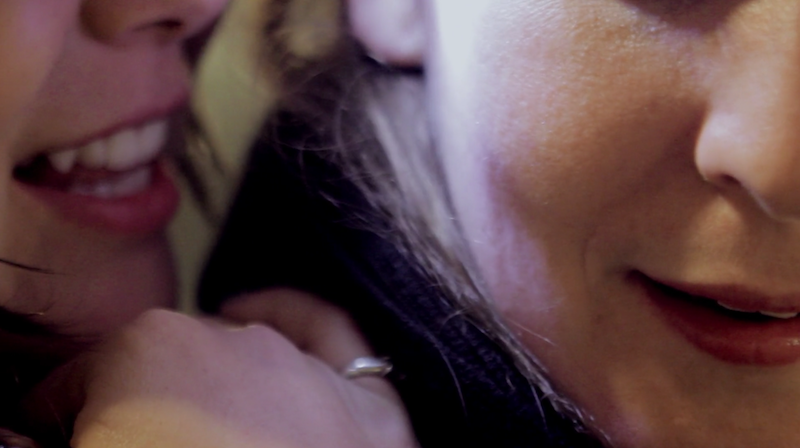
When something traumatic happens, in this case under the guise of professionalism, there is often cognitive dissonance about how to interpret it. Is this normal? Maybe I just don't understand how the process works. Am I making a big deal out of nothing? It's possible to feel both uncomfortable, aroused, and intellectually conflicted all at once. These contradictory emotions are often what make sexual assault so confusing for the person who experiences it. Human brains like stability and when something unexpected happens, there is a strong impulse to find the least painful way to make sense of it. Consider this Joan Didion passage from "The White Album":
We tell ourselves stories in order to live...We look for the sermon in the suicide, for the social or moral lesson in the murder of five. We interpret what we see, select the most workable of the multiple choices. We live entirely, especially if we are writers, by the imposition of a narrative line upon disparate images, by the "ideas" with which we have learned to freeze the shifting phantasmagoria which is our actual experience.
Sometimes it's easier to tell ourselves that we are in control... that we wanted to have sex instead of admitting that we were coerced. Channeling the sexual prowess of Samantha Jones is often preferable to identifying as a victim. My intention here is not to diminish autonomy by suggesting that Isolde's rendition of the story is untrue; I only wish to acknowledge the mental gymnastics that often accompanies sex without explicit consent. For all I know, maybe Isolde did want the masseuse with the "big dorky chain" to eat her pussy. After she tells the story, she jokes to Sarah that she went to the front counter of the spa and said, "Seven passes, please!" If Isolde is okay with the service she received, then fine. But as an outside observer, the red flags are hard to ignore.
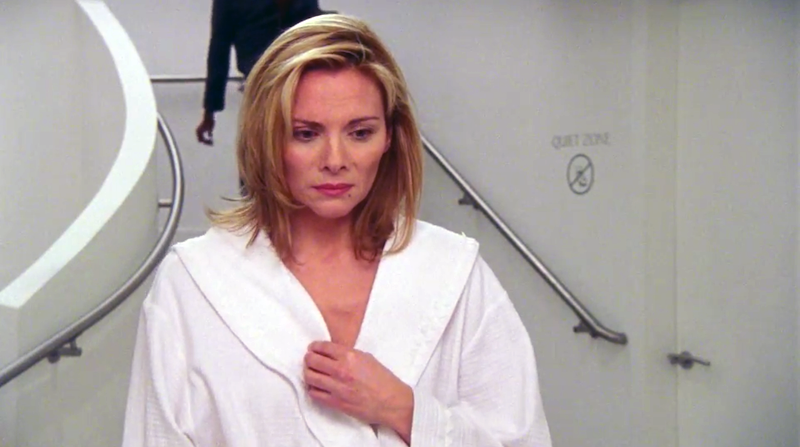
There is a difference between paying for sex and paying for a service that unwittingly turns into sex. If done ethically, the former is fine (with caveats, but that's another conversation); the latter will always be problematic. What would the masseuse have done if Isolde had rejected him? Would he have respected her response? Women are already confronted with unsolicited sexual advances far too often. Is it too much to ask that when a professional service is being rendered, it stays professional unless previously agreed upon terms have been reached? In my twenties, I would have found Isolde's frank discussion of casual sex empowering. A "yaas, queen" moment, if you will. In my thirties, I've experienced too much questionable shit not to consider alternative angles.
Later, when the film tepidly confirms that Isolde is "Pony" from the earlier phone call scene, there's a strange moment of sexually charged deflection reminiscent of the salt scrub story. At this point in the narrative, Sarah and Isolde have already been at the camp for a few days. Sarah has expressed interest in Steph, while Isolde has described him as "annoying." By the end of the night, everyone has loosened up with the help of slivovitz, and it seems like Steph has become less annoying to Isolde. At one point, Sarah and Steph are inside chatting before he abruptly leaves. When Sarah runs into him later, he's sitting outside in a group that includes Isolde, telling stories about pets. As Steph talks, the camera lingers on Isolde's bemused face in profile. It's unclear if there is a legitimate attraction between them or if Sarah is misreading the situation. Everything seems fine as Sarah and Isolde walk off into the woods, leaning on each other for support.
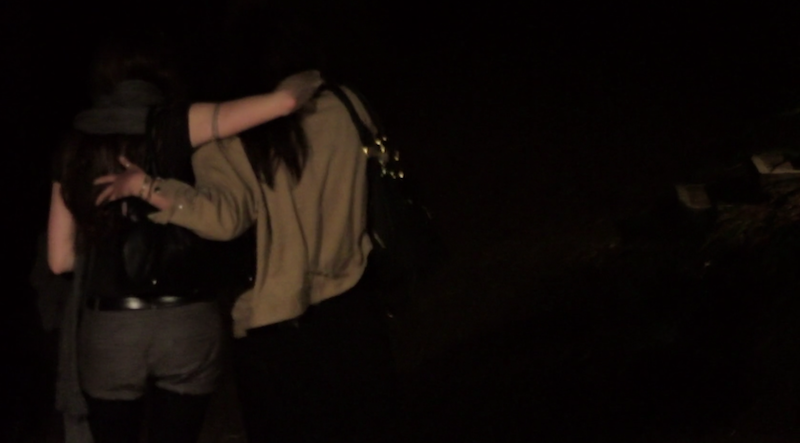
As soon as they're out of earshot of the group, Sarah and Isolde have the following exchange with their backs mostly to the camera.
Sarah: How are you?
Isolde: Good.
Sarah: No, I mean... (laughing) No, I mean, how are you? Like, how are you since everything?
Isolde: When?
Sarah: When you woke up and you were in New York in that really awful house?
Isolde: Oh, yeah, she's fine. Grandma, she just needs to switch her medications.
Sarah: No no no, that really awful house, and you were with those guys? Did you go to the hospital, or end up filing a report of any kind?
Isolde: Oh, oh, I just remembered it. Someone taught me when I was in first grade, and it was... A bad joke, it was like a dirty joke. And it was, 'Why did Raggedy Ann get kicked out of the, the toy box?' 'Because she sat on Pinocchio's head.'
I had to watch this scene numerous times before I felt like I understood what it was doing. The timing of this conversation feels provocative considering Isolde's "flirtation" with Steph, Sarah's clearly established crush. As an objective viewer, I'm not sure if Isolde was actually flirting with Steph; however, I think this is how Sarah interpreted the situation. Steph left her alone in the dance hall so that he could come outside to drink with Isolde. When Sarah found them, they were laughing together and having a great time. The camera lingering on Isolde's face seems to establish a connection (or at least a perceived connection) between them. The film's perspective has always been more aligned with Sarah, so it feels like the camera is showing us where her attention lies.
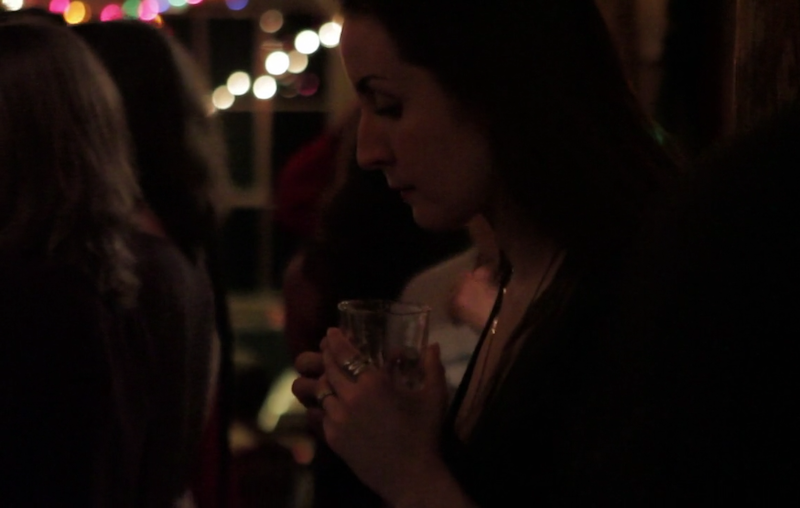
Even if Sarah isn't being provocative and really wants to know how her friend is coping, it's confusing that she doesn't mention her own, eerily similar situation. What we saw at the beginning of the film is completely thrown into question because Sarah never talks about it. Isolde likewise refuses to acknowledge that anything bad happened to her. But neither woman denies it, either. Instead of asking Sarah what she's talking about, Isolde first deflects by giving a nonsensical response about her grandma. This is doubly confusing because when Sarah first answered Pony's phone call back in New York, I did sort of think that she was dealing with an elderly, confused relative. One of the first questions Sarah asks is, "What do you mean you don't know where you are?"
When Sarah clarifies and tells Isolde that she is specifically talking about the situation with the "awful house" and "those guys," Isolde tells a raunchy sex joke. Just like with their earlier bathroom conversation, there is a desire to avoid vulnerability. Instead of having an emotional, honest exchange about harmful sexual experiences, these women feel the need to posture... to replace their hurt with a facade of empowerment. Instead of truly connecting, they're dancing around what is important and favoring less humiliating versions of themselves. This sounds like a judgmental thing to say, but I don't mean it like that. Many women have dealt with similar friendship dynamics. Sometimes, it's easier to laugh and pretend like it never happened instead of ruining someone else's day with a pain that feels near universal for women.
There is a desire to adopt a (traditionally) "masculine" approach to handling trauma: compartmentalize the shit out of it and pretend that it never happened to avoid being seen as "weak." But exhibiting vulnerability isn't weak. It ensures that bad feelings don't eat us up at night, chipping away at our self-identities and forcing us to adopt personas that don't actually reflect who we are inside. Sarah and Isolde never manage to have a single honest exchange at the Balkan camp. They are close enough that Isolde called Sarah after something horrible happened to her, but not close enough to figure out a way to discuss the aftermath of those events. As they dance around their respective traumas, they grow farther apart. Resentment and jealousy fester; isolation is imminent.
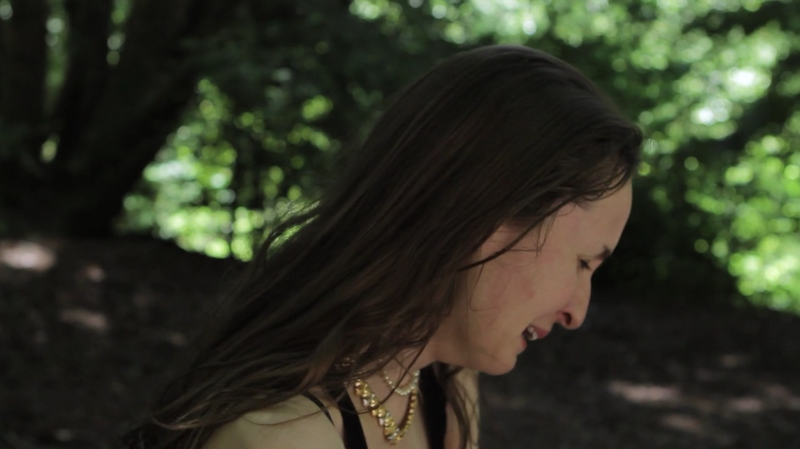
To me, "Butter on the Latch" is a horror story about what happens when women try to adopt the patriarchal "male" approach to dealing with trauma. Friendships carry on, strained but surface level acceptable, until rage rises to the surface and tears everything apart.





